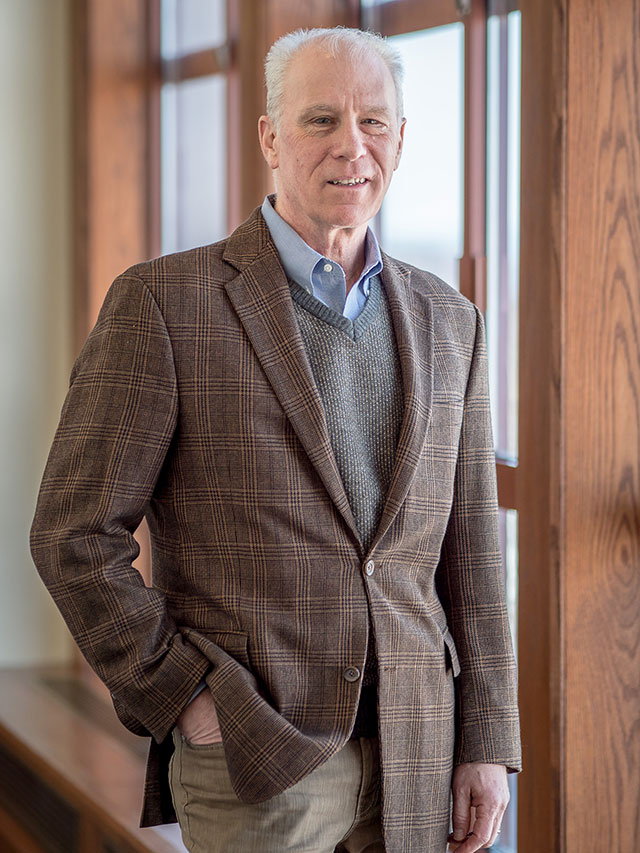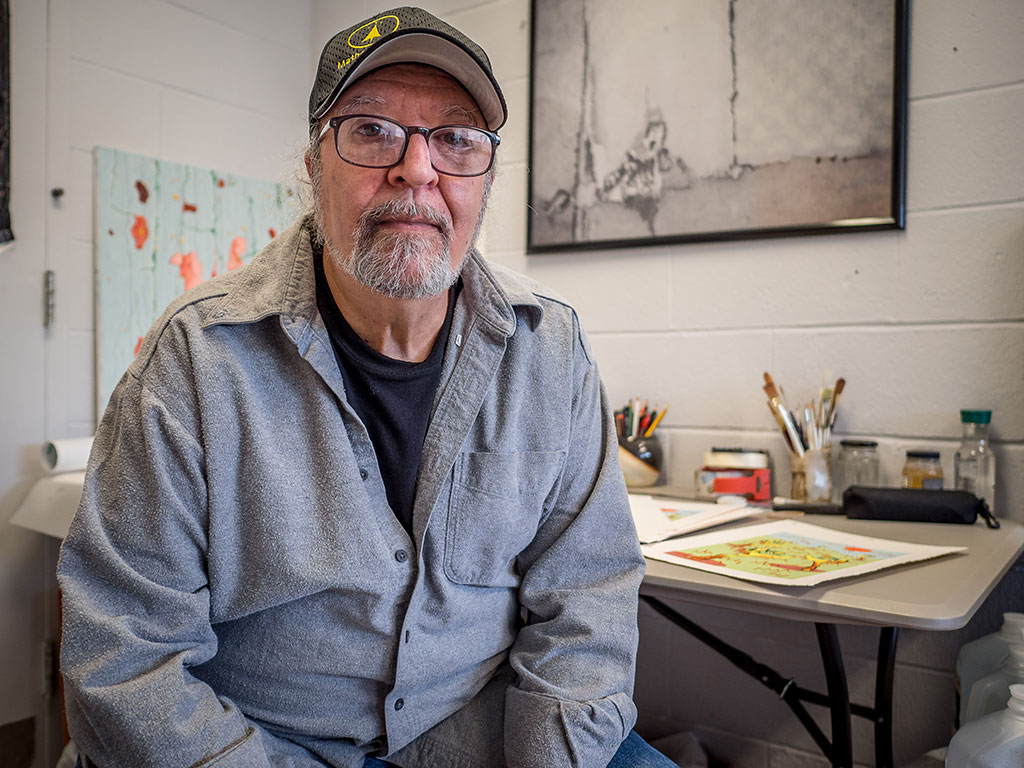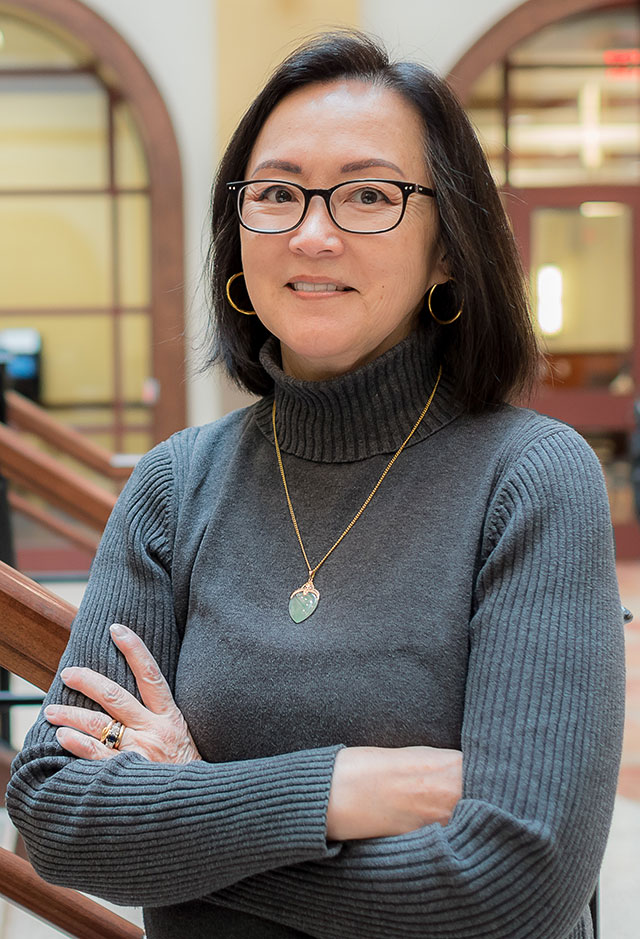Act 2
Older students discover new joys and passions through lifelong learning
In the wings of the New Jersey Performing Arts Center in Newark, Hermine Bartee is getting ready for her encore. As an opera singer and actress, she’s accustomed to being in the spotlight, but on this Sunday afternoon in January, there’s no need for vocal warmups, just family to help adjust a traditional red cap and gown as she takes center stage to mark her academic achievements at Montclair State University.
The Graduate School Commencement culminates a second act that has seen Bartee earn a master’s degree in music therapy and additional certificates. She draws on her artist roots to treat patients with depression, Parkinson’s and autism. She’s also given voice to a movement within the profession to have the State of New Jersey formally recognize the licensing of music therapists, a bill that supporters say will bring needed recognition to the healing powers of music.
The Graduate School Commencement culminates a second act that has seen Bartee earn a master’s degree in music therapy and additional certificates. She draws on her artist roots to treat patients with depression, Parkinson’s and autism. She’s also given voice to a movement within the profession to have the State of New Jersey formally recognize the licensing of music therapists, a bill that supporters say will bring needed recognition to the healing powers of music.

“In what would be the evening of life, I am still pursuing and supporting a healthy active lifestyle,” the 79-year-old says.
Bartee is among dozens of older adults engaged in creative and intellectual pursuits at Montclair State. Experts point to the arts in all forms for enhancing the lives of older people and promoting physical health. On campus, you’ll find older students enrolled in classes, everything from Italian theater to pre-law in the University’s Older Adult Learning Program. There are also beginner and advanced musicians refining their technique in classes at the John J. Cali School of Music Extension Division.
“When you get older and your kids are out of the house, you can sit down and learn something new,” says the artist Chuck Hayden. He spent the fall of his 90th year learning jazz guitar at the John J. Cali School of Music Extension Division. “It’s fun.”
Lifelong Learning
Living close to campus has its perks. Neighbors have easy access to wide-ranging programming that shapes the University as a cultural, artistic and intellectual center for the community. For the active mind, most lecture series, interviews and discussions are free and open to the public. Internationally acclaimed artists and productions draw audiences to Peak Performances.
“At my stage of the game, there’s just a sheer pleasure and challenge in taking a class.”
As a concertgoer at Cali School performances (more than 200 are presented each year), Hayden was inspired to add another instrument to his repertoire. He has played the banjo for 80 years, loves jazz and also plays the four-string tenor guitar. Just a few blocks from campus, his apartment is filled with his paintings of the American West, cowboys and horses. Under the gaze of a bucking bull, a favorite rodeo motif (and yes, he once roped), Hayden practiced the fingering and chords of the guitar.
“I practice a lot because I have a lot to memorize,” he says.
His drive to learn a new skill is encouraged by experts. According to findings by the Association for Psychological Science, aging adults who engage in difficult tasks and learn new skills show memory improvements, among the physical and emotional well-being benefits of healthy aging.
“Later in life,” says Brian Abrams, associate professor of music therapy at the Cali School, “active engagement in music and the arts is a form of maintaining one’s humanity, one’s dignity, one’s possibilities for connecting and one’s possibilities for experiencing the beauty of life.”
Workouts For The Mind
Universities throughout the U.S. offer encore programs to help seniors make a social impact and learn new skills. At Montclair State, about 60 seniors are active in the Older Adult Learning Program, says Krista Hendrickson, the initiative’s coordinator. It is open to New Jersey residents who are at least 65 years of age and who possess a high school degree or its equivalent. Seniors enroll on a space-available basis with costs that include only administrative and student fees.
For Sally Baggett, the program allows her to take care of some of the undergraduate requirements she needs for a bachelor’s degree. She’s had a long and successful career in marketing and graphic design for high-tech software companies in California, and recently moved to Upper Montclair when her husband changed jobs. Through the years, Baggett has taken classes toward her elusive bachelor’s degree and has spent the past few semesters at Montclair State taking such classes as Spanish, macroeconomics and writing. “Hopefully I’ll get my degree before I’m 70,” she says.
W. Leonard Newman, a University supporter, has been taking classes for the past 22 years, mostly in the humanities and social sciences. “You have to have some consuming passion during your retirement,” says Newman, 89. “Some people play golf, others play cards. It doesn’t matter what you do as long as you are doing it for psychic enjoyment.”

This spring, Ken Browne, a Montclair resident and videographer, was volunteering on campus at an Italian Language and Culture Day for high school students, among the ways he takes advantage of living close to campus. Already a fan of performances at the Alexander Kasser Theater and minor-league baseball at
Yogi Berra Stadium, his love of the Italian language inspired him to take a class in the history of Italian theater, an experience he describes as a “workout for your mind.” Through that class, he’s read the works of Carlo Goldoni and Luigi Pirandello, performed in plays and skits, and enjoyed a variety of learning experiences outside class, including attending an Italian theater performance in New York City.
“At my stage of the game, there’s just a sheer pleasure and challenge in taking a class,” Browne says. It also has its perks. This summer, he will take part in a research project in Sicily.
“Availing yourself of these learning opportunities is just too good a thing to pass up,” Browne says. “Even though I’m an older student, the students and professors are welcoming. And you get right back into the academics like you’ve never left school, right back into the fl ow of homework and assignments.”
For A Quarter Century One Class At A Time
Richard Franco, a painter, is a familiar face in the University’s fine arts studios. He blends in easily with other students, despite a 50-something-year age gap, as they share in the creative inspirations born in Calcia Hall. Students look up to him. “I’m older and wiser but I’m not an authority figure. It makes them more comfortable,” he says.
Franco was working for the U.S. Postal Service in North Jersey when, with some extra time on his hands and a few credits earned years earlier, he decided to go back to college. He had enjoyed art while growing up and selected a papermaking class. It changed the course of his adult life. “I fell in love with art again,” he says of the experience, his first project – a sculptured bird with wings recycled from the pages of a book – displayed in his work space.
“Creativity is good for a whole bunch of things. It’s good for your mind. It’s good for your soul. It’s good for your body … I plan on taking classes until I can’t get to campus anymore.”
Each semester Franco selected another medium and learned the techniques of jewelry making and photography, exhibiting work on and off campus. He started taking the required courses to earn a bachelor’s degree, which he received after 23 years, one class each semester at a time.
At the age of 68, he’s now part of the Older Adult non-degree program, this spring semester taking a class in museum studies while continuing to work on his art and challenging himself to learn new techniques in printmaking and ceramics. “Being a student is just what I do,” he says.

Franco retired seven years ago from the Postal Service and can now be found on campus most days.
“Creativity is good for a whole bunch of things,” he says, musing on the benefits of the arts and learning for healthy aging. “It’s good for your mind. It’s good for your soul. It’s good for your body … I plan on taking classes until I can’t get to campus anymore.”
Music Makers
At the John J. Cali School of Music Extension Division, adults often find it’s never too late to learn. Some are new to their instruments, others refine their technique and artistry, as they fit practicing into their busy schedules. Among the students, Carmelle Lucas, who has taken piano lessons on and off for the last 19 years, the past two at Montclair State, credits her Cali School teacher with tapping into her strengths on how she best learns. “It’s very challenging,” she says. “I’m enjoying the whole process.”

Now Bartee is using her operatic training and music’s healing abilities to engage seniors with dementia and children with autism, taking a creative and integrative approach to wellness and mental health. “I’m able to reach people who are difficult to reach,” Bartee says of the rewards of her later-in-life academic and career choice. “Music helps them open up and tell you all the secrets of life.”
A champion long-distance runner and a runner-up in New Jersey’s Ms. Senior America (and likely only because she tripped on the three-inch heels she hadn’t worn for 20 years), Bartee shows no signs of slowing down. She is working on earning the Certified Alcohol and Drug Counselor Certificate and opening a private music therapy practice. She hopes to recreate in two years the 50th anniversary of her New York City debut at Carnegie Recital Hall if her voice remains strong.
“My family, genetically we don’t stop,” Bartee says, adding that her mother lived to be 109. “Everyone says I look like her, so maybe I still have another 30 years.”